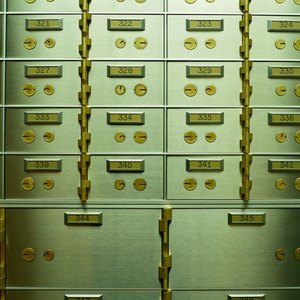
If you put money into your bank account -- whether it's a checking, savings, certificate of deposit, money market deposit or individual retirement account -- the Federal Deposit Insurance Corporation insures each account for up to $250,000. If you place items in your safe deposit box at that same bank, there is no FDIC coverage.
Why There's No FDIC Protection
What you put in your safe deposit box is your own business. Many people use it as a place to store large amounts of cash, jewelry, rare coins and stamps and important documents. It's not the bank's business what you choose to place inside your box, although you shouldn't store anything illegal in it. Because you don't have to tell anyone what you're putting in the box, there's no way for the FDIC to verify what's in there. In effect, it's merely a secure storage space the bank provides to its customers.
Why a Safe Deposit Box?
Even if the contents aren't insured, there are many good reasons for renting a safe deposit box at a local bank. It's less likely to be burglarized than a home safe. No one can access your box unless you permit them to become a joint holder. Rules on joint safe deposit boxes vary according to the individual bank and state law. If you die or become incapacitated, it generally takes a court order to open your box if you don't have a joint owner.
Insurance Options
While FDIC insurance isn't an option, some banks might provide limited insurance for your safety box in case of destruction or serious damage. You can discuss this with a bank official before renting a box. As the FDIC website points out, companies manufacturing these boxes and their storage vaults make them very resistant to natural disasters or explosions, but there's no 100 percent guarantee that they can't be destroyed. It's possible that your homeowner's insurance policy might cover your box's contents up to a certain amount. You can contact your agent about purchasing additional coverage for your box.
Bank Failures
If your bank fails, that doesn't mean you can't access your safe deposit box. The FDIC website states that the full contents of the box "should be available the first business day after the bank closes." Usually, another bank acquires the failed institution, and you can keep your box in its current location. If that doesn't happen, the FDIC is in charge of sending box holders information regarding removal of the contents.
Abandoned Boxes
Banks charge an annual rental fee for each safe deposit box. If you have a checking account with the bank, it can be arranged as an automatic payment. If you stop paying the rent on the box, the bank will notify you to collect the contents. State law determines when the uncollected contents become unclaimed property and can be sold off.
References
Writer Bio
A graduate of New York University, Jane Meggitt's work has appeared in dozens of publications, including Sapling, Zack's, Financial Advisor, nj.com, LegalZoom and The Nest.

